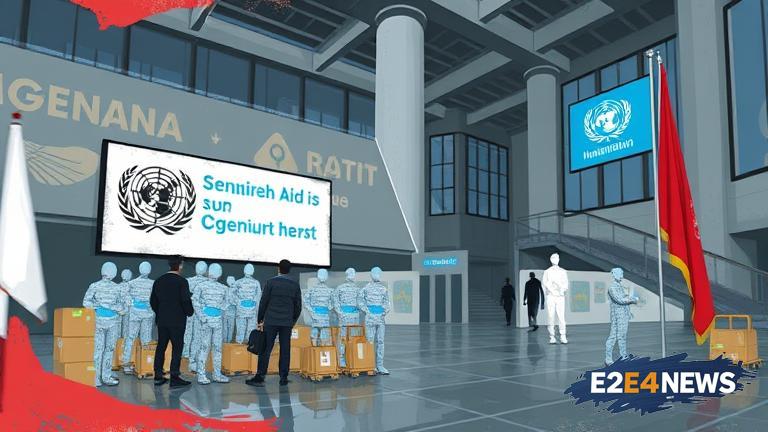The city of Geneva, known for its humanitarian hub, is facing an unprecedented crisis as the aid freeze begins to take its toll. The funding shortfall has left many organizations struggling to continue their operations, with some even considering downsizing or relocating. The ripple effect of the aid freeze is being felt across the city, with many businesses and individuals who rely on the humanitarian sector also being impacted. The Geneva-based organizations, which include the United Nations High Commissioner for Refugees (UNHCR) and the International Committee of the Red Cross (ICRC), are among the most affected. These organizations have been working tirelessly to provide aid to those in need, but the lack of funding is making it increasingly difficult for them to continue their work. The aid freeze has been caused by a combination of factors, including a decline in government funding and a decrease in private donations. The COVID-19 pandemic has also had a significant impact on the humanitarian sector, with many organizations facing increased costs and reduced funding. The situation is further complicated by the fact that many of the organizations based in Geneva rely on funding from governments and private donors, which can be unpredictable and subject to change. The aid freeze has already led to a reduction in staff and programs, with many organizations being forced to prioritize their activities and focus on the most critical areas. The impact of the aid freeze is not limited to the humanitarian organizations themselves, but is also being felt by the local community. Many businesses in Geneva, such as hotels and restaurants, rely on the humanitarian sector for customers and are therefore also being impacted. The city’s economy is also likely to be affected, with the aid freeze potentially leading to a decline in economic activity. The Swiss government has announced plans to increase its funding for humanitarian organizations, but it remains to be seen whether this will be enough to offset the impact of the aid freeze. The international community is also being called upon to provide additional funding to support the humanitarian sector. The situation in Geneva is a stark reminder of the importance of predictable and sustainable funding for humanitarian organizations. The aid freeze has highlighted the need for a more robust and resilient humanitarian system, one that is better equipped to respond to crises and provide support to those in need. The humanitarian organizations based in Geneva are working tirelessly to find solutions to the funding shortfall, but it is clear that a long-term solution will require a concerted effort from governments, private donors, and the international community. The city of Geneva is known for its commitment to humanitarian work, and it is likely that the aid freeze will have a significant impact on the city’s reputation as a hub for humanitarian organizations. The aid freeze has also raised questions about the sustainability of the humanitarian sector, with some experts warning that the sector is facing a crisis of funding and legitimacy. The situation in Geneva is a wake-up call for the international community, highlighting the need for a more sustainable and predictable approach to humanitarian funding. The humanitarian organizations based in Geneva are calling for a renewed commitment to funding and support, and it remains to be seen whether the international community will respond to this call. The aid freeze has already had a significant impact on the humanitarian sector, and it is likely that the effects will be felt for some time to come. The city of Geneva is facing an unprecedented challenge, but it is also an opportunity for the international community to come together and find a solution to the funding shortfall. The humanitarian organizations based in Geneva are resilient and determined, and it is likely that they will find a way to overcome the challenges posed by the aid freeze. However, the situation highlights the need for a more sustainable and predictable approach to humanitarian funding, one that is better equipped to respond to crises and provide support to those in need.
